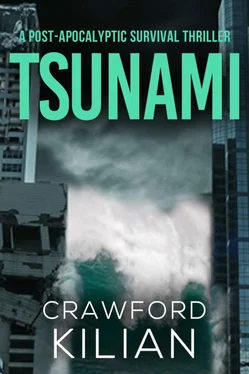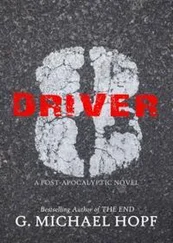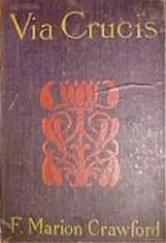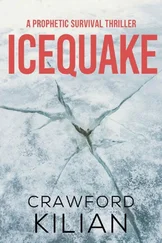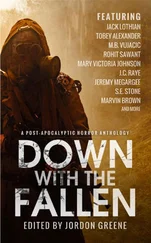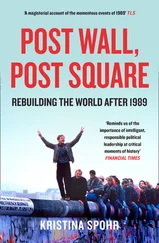The cable drum, mounted just forward of the sail, shrieked. Squid shuddered. The roar of the cruiser’s propellers changed pitch; seconds later a muffled thump came through the sub’s hull. The propellers fell silent.
Morrie looked at Don.
“Well,” he said, “we got her roped and hog-tied. Now all we gotta do is brand her.”
Using his manipulator, Don drilled a hole partway through the cruiser’s hull, about ten metres forward of the tangled propellers. Rotating the tool module at the end of the manipulator, he brought an air-driven riveter into position. Morrie, using his manipulator, took an aluminium disc from the basket below the observation bubble. The disc had a flat rim, but bulged out in the middle on one side. While Morrie held the disc against the hull, Don drove a rivet through the rim. Squid glided fifteen metres forward, and the two men repeated the process. Ten minutes after the cable had snarled the propellers, three powerful explosive charges were attached to the cruiser’s hull.
Morrie steered the sub back towards Rachel and the surface. It was brighter now; when they reached the surface the fog had thinned enough to allow a glare of sunshine.
Einar and Chief winched Squid aboard the barge and helped the two men out. Morrie checked his watch.
A moment later three concussions, close enough to feel almost like a single one, struck them. A siren began to whoop in the distance.
“D’you think we really did it?” Don asked Morrie as the men clambered off the barge and onto Rachel’s stern.
“We did it,” said Morrie. “Those aluminium jobs are built to be quick, not tough.” He shuddered suddenly and jammed his hands in his pockets. “I just hope we didn’t hurt too many people,” he added hoarsely.
Chief started the tug’s engines, and Bill Murphy steered cautiously through the fog. Don and Kirstie acted as lookouts in the bows. Through the open windows of the wheelhouse came sporadic thumps and the endless whooping of the cruiser’s siren.
For the next hour or more, as they moved through the fog, they could hear the sounds of steady destruction: sirens, explosions, the rush and bang of flames. Then Rachel was out of earshot, moving slowly through fog that thinned and thickened.
“It sounds bad in Berkeley,” Einar told Don as the tug entered the Golden Gate. “The soldiers are pushing east from the freeway, and the militia are retreating to the campus. They think they are fighting maybe five hundred soldiers, with a lot of firepower.”
“What about San Francisco?” Don asked.
“The Presidio has surrendered. Many soldiers have gone over to the locals.”
Don turned to Bill. “Can you take us to Hunter’s Point?”
“Sure, but why?”
“To get some help for Berkeley.” Don paced across the wheelhouse, his arms folded and his hands in fists.
* * *
During much of the afternoon, the soldiers had taken cover from the sun; from office buildings around Shattuck and University, they fired at the militia’s defensive positions between Shattuck and the campus. Twice, the militia had tried to rush the attackers’ forward positions; both times the assaults were turned back, leaving dozens of dead and wounded in the square and nearby streets.
Late in the afternoon, with the sun in the militia’s eyes, the soldiers left their positions and assembled for a full-scale attack on the campus. It started with mortars and recoilless rifles, shattering the militia’s forward positions and disrupting their communications across the campus. Fires broke out; black smoke rose above the tower of the campanile.
The soldiers, meanwhile, formed into three groups: while the main body stayed on University, west of the square, two other groups formed wings that moved north and south on Shattuck. The wings would draw off some of the defenders, while the main body thrust onto the campus.
Within a few minutes, the sputtering gunfire from north and south showed that the wings were in position and engaging the militia. The main body, over three hundred men, poured from doorways and alleys onto the sidewalks and sprinted east across the square towards the campus.
Almost at once, rifles and machine guns opened up behind them. The surprised soldiers slowed and turned; with the sun almost on the horizon, they could not see their attackers. In seconds, fifty or sixty soldiers were dead; the rest ducked into doorways, or ran along Shattuck towards the wings. Enfilading fire from farther down Shattuck cut them to pieces. Retreating towards University, they ran or crawled for cover under heavy fire. No coherent defence developed, only clusters of frightened men shooting blindly into the yellow glare of the sinking sun. Many tried to escape through buildings into nearby streets and alleys; some succeeded, but more were cut down.
The attack on the campus collapsed into short-lived firefights and panicky surrenders. Running up University came two hundred militia, while another fifty came up Shattuck from the south; most of them were blacks from Hunter’s Point. They disarmed the surviving soldiers and herded them into a parking lot. A few minutes later the remnants of the wing groups were marched in to join them.
Mitchell Eldon, commanding the Hunter’s Point militia, found the senior surviving officer in a corner of the parking lot. He was a bearded black man wearing captain’s bars on his filthy fatigues.
“I don’t exactly know what to do with you, brother,” Mitchell said softly. “You cost us at least a couple hundred dead and hundreds more wounded.”
“I was carrying out my orders,” the captain said.
“Well, I expect you will carry out the local council’s orders for the next little while. We can’t massacre you, and we ain’t gonna turn you loose, and we sure as hell ain’t gonna give you free room and board. So I guess you and your boys will be doing some community improvement for a while. For starters, you can pick a detail of ten men to collect the bodies.”
“Like hell I will.”
Mitchell reached up and took off the captain’s sunglasses. “How’d you like to run around tomorrow without your shades on, brother? How long do you think your eyes would last?”
The captain turned and stabbed a finger at the ten nearest men. Mitchell handed him back his sunglasses.
* * *
The crew of the Rachel stayed in Berkeley harbour after offloading the militia. Towing the barge and three sailboats, the tug had brought almost three hundred local militia from Hunter’s Point. Many were ex-soldiers, and some of the older ones were veterans of Vietnam. They were armed with M-16 rides, M-50 machine guns, grenade launchers and bazookas; their ammunition, taken from the Presidio, was almost limitless.
The crew’ sat in the wheelhouse, talking very little, listening to the buzz and crackle of the radio. The local had devised a crude code, but under pressure of combat the militia leaders were reporting their predicaments in clear. After listening for a while, Iinar got up.
“I am too worried. I must go to see Sam.”
“You’re not likely to find him,” said Kirstie. “He’ll probably be with the local executive, wherever they are. The wrong side of the soldiers, anyway.”
“I will go at least to his house. It is not so far. If he is not there, I come right back.”
As Einar stepped onto the dock, the popping of distant gunfire sounded clearly.
“What happens if we lose?” Morrie asked Don.
“God, I don’t know. Run like hell back to Vancouver, I guess. Or to some surviving local. But I’d be damned angry, after we’ve got this far.”
“Personally, after what I’ve seen of California so far, I’ll be damn glad to be home again. This is a scary place.”
Читать дальше
